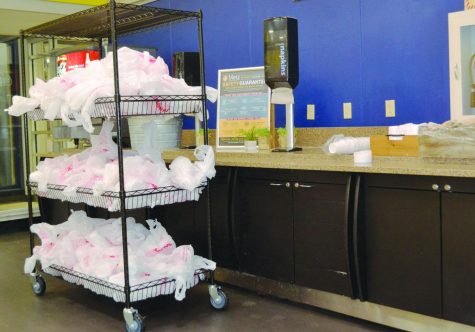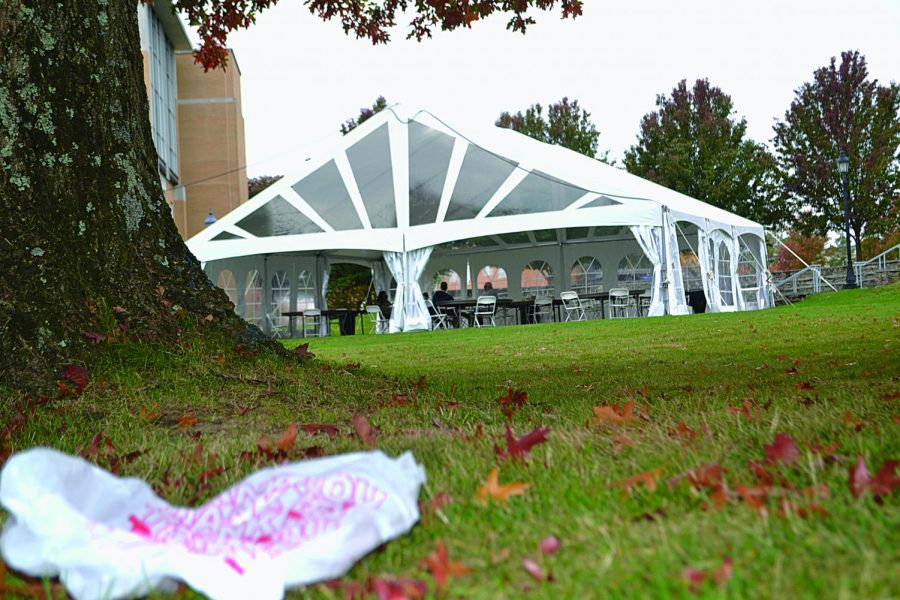New Food Take-Out System Raises Environmental Concerns
A plastic bag from the Metz Dining Hall lies on the ground near the outdoor tent eating area as teachers and students are eating their take-out food.
Members from Student Government Association and the Environmental Sustainability Committee and Eco-Reps club are finding ways to reduce waste in light of new policies implemented by Metz Culinary Services.
University officials and Metz Culinary Management staff worked with staff and faculty, including the ESC, and agreed to implement a take-out dining system to allow for better social distancing and a reduction in the risk of infection through touch.
Each diner now receives a plastic bag that contains a Styrofoam cup and paper utensils wrapped in a paper napkin, according to the Metz Fall 2020 reopening plan PDF document found at metzmu.com. They then order food to be put in plastic containers to take out of the dining hall and eat elsewhere.
The downside of this system, as Director of Campus Ministry and member of the Sustainability Committee Christine Somers pointed out, is how much waste is created from the single-use plastic and Styrofoam items.
“I don’t think it was anyone’s intention to not think about being sustainable. The university is raising the question, and now students are raising the question. I think if we are going to be more sustainable, we have to work on it together,” said Somers.
She said this is an even bigger concern when thinking about the number of products being used and thrown out each day.
“You are talking about thousands of thousands of thousands of products at this point. If you go through a semester and do this three times a day, it all adds up,” she said.
Kaitlyn Furr, junior occupational therapy student, believes the new take-out system gives students freedom of where they want to eat.
“I think that the option gives students a lot more flexibility for them, but also their lifestyles. So, it allows them to eat food wherever they want on-campus or in their rooms. They can be out in the nice weather,” said Furr.
She believes that while the new system adding flexibility for students is a good thing, there is a long-term environmental impact students may not be aware of.
“It is just a lot of single use items. I see a ton of stuff in the garbage that we are then contributing to the landfills,” she said.

Caitlyn Coyle, junior pre-DPT, medical health and humanities major as well as Academic Coordinator for SGA, believes the take-out system has also influenced life in the community.
“No one has been socializing. In the social aspect, the grab-and-go has been an issue because people aren’t in the café anymore and talking anymore. It is sad that this is going on,” said Coyle. “Being in the café was the highlight of my day. Sometimes I would go in there just to talk to my friends.”
Coyle believes the campus community needs to be more aware of the university’s core values and standards.
“Our core standards here are to support the environment and sustainability, and that is the opposite of what is going on,” states Coyle. “The faculty, staff and students just need to be more aware of our critical concerns of Mercy and what we stand for. We should support that rather than saying we believe in one thing and doing the complete opposite. It kind of comes off as hypocritical.”
Catherine Hodges, senior psychology major and treasurer for the Eco-Reps club, believes students are fearful of using the main cafeteria due to the pandemic, and their apprehension may explain why many prefer to use the take-out system.
“People have definitely taken advantage of the eating areas instead of the café,” Hodges said. “They have the capacity screen and it is always in high numbers of people that are allowed in the café still. I have never seen it at full capacity.”
Hodges, who is also a member of the lacrosse team, reminisced on how eating inside the cafeteria strengthened her bond with her team.
“When I would go to the café, we would sit as a whole team. We can’t do that right now,” she said.
Hodges, as well as all members of the environmental committees on-campus, are encouraging students to offer ideas about how the university can remain respectful of the environment as it ensures safety.
Morgan Karas, senior government, law and national security major and former member of SGA, mentioned that switching to biodegradable containers may help reduce waste.
“I feel super guilty when I take stuff out of the café because I’m taking all of those bags, all of those silverware and Styrofoam,” Karas said. “You know those soup containers? Those are more biodegradable. I don’t understand how they can’t use more stuff like that. Yeah, they are more costly, but that’s also less waste too.”
SGA also sent out a “call to action” email to all students asking them to bring their own reusable containers when they take out food, according to Karas.
Hodges said the Eco-Reps club may have developed a “greener” plan regarding the use of reusable containers.
“Since we still have reusable containers on-campus, we could bring it into the café. When we come into the doors, where we normally put the plates back to be washed, we would put the used containers there, and we can get a new container at the food line,” Hodges states.
The environmental committees emphasize that the increase in waste is no one’s fault. Somers said the take-out system was developed out of necessity.
“There were two issues. One issue was the price of using compostable goods or reusing things, and the other issue was because of COVID. So many restaurants had suppliers that were using a lot of those products, so it was hard to get. That is why it landed us in the position we did not want to be in,” Somers said.
She said COVID is not going away soon, and the community needs to make a change to save the environment.
“When it comes to the environment and caring for the earth, there isn’t just wasting and over-consuming, but also being mindful of what we use and how we use it,” Somers said. “Students, if this is important to you, then you should go eat in [the dining hall] once a day or twice a day. I just don’t see it going away right now because of COVID.”
As the outbreak continues and the academic year remains in-person, Hodges said students must believe that the actions of each person are impactful.
“Be the change that you want to see. Don’t just think about your future. Think of your planet’s future, your children’s future if you want them to have a decent life,” she said. “By not helping, you are now part of the problem.”

